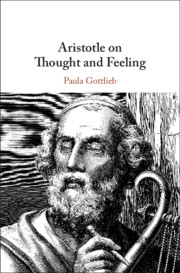Book contents
- Aristotle on Thought and Feeling
- Aristotle on Thought and Feeling
- Copyright page
- Dedication
- Contents
- Acknowledgments
- Abbreviations
- Introduction
- 1 The Psyche
- 2 Aristotelian Feelings
- 3 Developing Thought and Feeling
- 4 Aristotelian Choice
- 5 Akrasia
- 6 Thoughtfulness and Feelings
- 7 To Kalon and Music
- Conclusion
- Glossary of Key Terms
- References
- General Index
- Index Locorum
1 - The Psyche
Published online by Cambridge University Press: 08 January 2021
- Aristotle on Thought and Feeling
- Aristotle on Thought and Feeling
- Copyright page
- Dedication
- Contents
- Acknowledgments
- Abbreviations
- Introduction
- 1 The Psyche
- 2 Aristotelian Feelings
- 3 Developing Thought and Feeling
- 4 Aristotelian Choice
- 5 Akrasia
- 6 Thoughtfulness and Feelings
- 7 To Kalon and Music
- Conclusion
- Glossary of Key Terms
- References
- General Index
- Index Locorum
Summary
I discuss Aristotle’s account of the psyche (soul) in book 1 chapter 13 of the Nicomachean Ethics, his further distinction between theoretical and practical thinking in Nicomachean Ethics VI 1, and the famous function argument of Nicomachean Ethics I 7. I also address Aristotle’s unclarity about how to characterize desire, and his skepticism about parts of the psyche in de Anima III 9. This leads to a brief discussion of Plato’s division of the psyche in Republic IV and the Phaedrus, and whether both Plato’s and Aristotle’s divisions lead to problems concerning the unity of motivation. This discussion begins to set the stage for my interpretation of Aristotelian prohairesis (often translated as “choice”), the characteristic motivation of the good person. As we shall see, the phenomenon of choice straddles different parts of the Aristotelian psyche in a way that Plato never envisaged in his own account of the psyche.
- Type
- Chapter
- Information
- Aristotle on Thought and Feeling , pp. 13 - 23Publisher: Cambridge University PressPrint publication year: 2021

